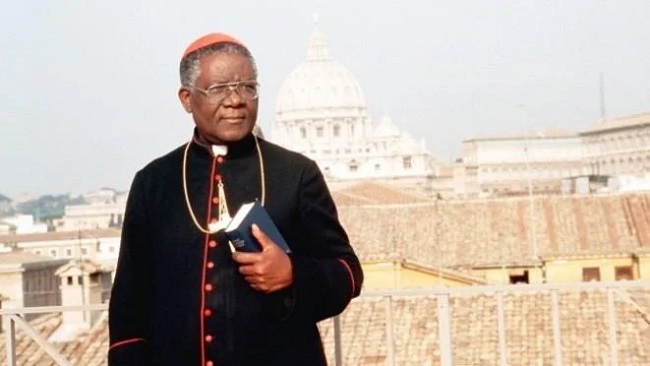Christian Tumi: Church leaders use cardinal’s funeral to call for end to violence
Getting into a taxi in Cameroon’s economic capital, the driver looks at a poster hanging in the street of Cardinal Christian Tumi.
“A great man has quit the scene,” the taxi driver tells this author. “If only President Biya had listened to him, [the Anglophone crisis] could have been resolved.
Nearly five years ago, English-speaking lawyers and teachers began striking over efforts to change the common law legal system and British-based schooling system the two Anglophone regions inherited from Cameroon’s colonial era. The majority of the country is French speaking.
The protests were violently suppressed by the central government, leading to a separatist insurgency intent on establishing an independent country called “Ambazonia.”
The fighting has killed at least 3,500 people and forced more than a million from their homes, according to the United Nations. The separatists have also enforced a school boycott in the two provinces, keeping children from receiving an education for years.
Tumi, who died on April 3 at the age of 91, called for a just solution to the crisis, saying a return to a federal system of government was the best path to follow.
The cardinal’s funeral was held on Monday at Sts. Peter and Paul Cathedral in Douala.
“He remained constant in his fight for justice and peace, and for the past four years, and almost in singular and monomaniac fashion, for reconciliation of Cameroonians involved in the Anglophone problem,” said Bishop Abraham Kome of Bafang, President of the Bishops’ Conference of Cameroon.
“He put his last energy into trying to resolve this conflict. Maybe he dies dreaming of a reconciled country, of a more just and fraternal country, perhaps he deserves in his memory, that we finally end this unnecessary war,“ he said.
While praising his courage in such troubling times, Archbishop Samuel Kleda of Douala said all Cameroonians were responsible for solving the problems plaguing the country, and noted that “the best homage we can pay to the cardinal is to continue the fight against inequalities, injustices, corruption in our country, and to try to create a society where everybody would ,in a just manner, have access to the wealth of this country and where the rights of everyone are respected.”
“He dedicated all his life to fighting injustice. He fought for the poor, the oppressed, the marginalized, those who suffer, those whose rights are abused and those who have lost all hope,” the archbishop said.
“In his fight, the cardinal had a dream for Cameroon: That Cameroon should be a country where peace and justice reign,” Kleda added.
Cardinal Philippe Ouédraogo of Ouagadougou in Burkina Faso and president of SECAM, the African regional group of bishops’ conferences, used Tumi’s funeral to stress the need for guns to go silent, not only in Cameroon but elsewhere in Africa.
“Africa has had enough,” he said.
“People hungry for blood like Cain kill their brothers without any reason. All violence against any human being is an attack on God himself because God made man in his own image,” the cardinal continued.
He called on the forces of law and order to stop killing – especially civilians – and instead “protect human life and foster peaceful co-existence.”
Noting that Tumi was a champion of democracy and human rights in Africa, Ouédraogo said Africa had “lost a prized asset.”
Participants at the funeral also praised the late cardinal for his frugality and simple lifestyle.
“Cardinal Tumi never even had a bank account,” said Kleda.
Even President Paul Biya, who often faced Tumi’s blistering criticism over his handling of various crises and corruption, praised the cardinal.
“Cardinal Tumi undoubtedly marked the history of our country, Cameroon that he deeply loved, and whose progress he tirelessly worked for,” the president said. “The message of peace, love and progress which he carried along his pastoral ministry will forever remain in our memories.”
Church leaders promised to keep promoting the values that Tumi championed until he died.
“The precious fight you engaged in for human dignity and for justice will not die with your death. We will continue with the fight,” Kome said.
Source: Angelus





